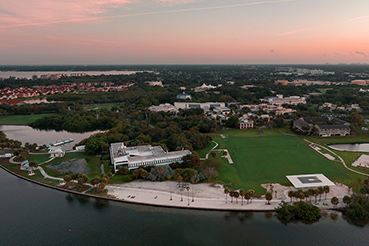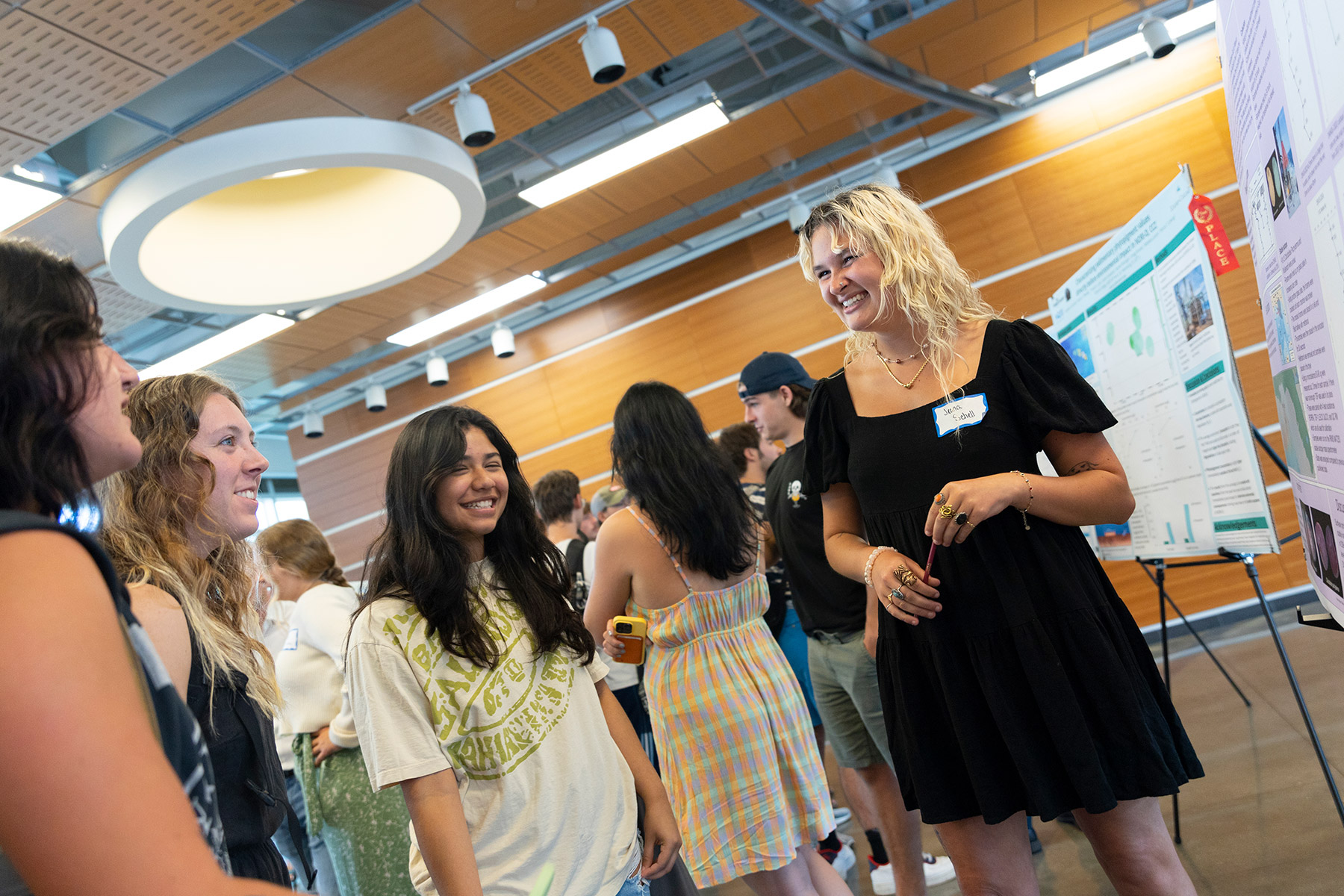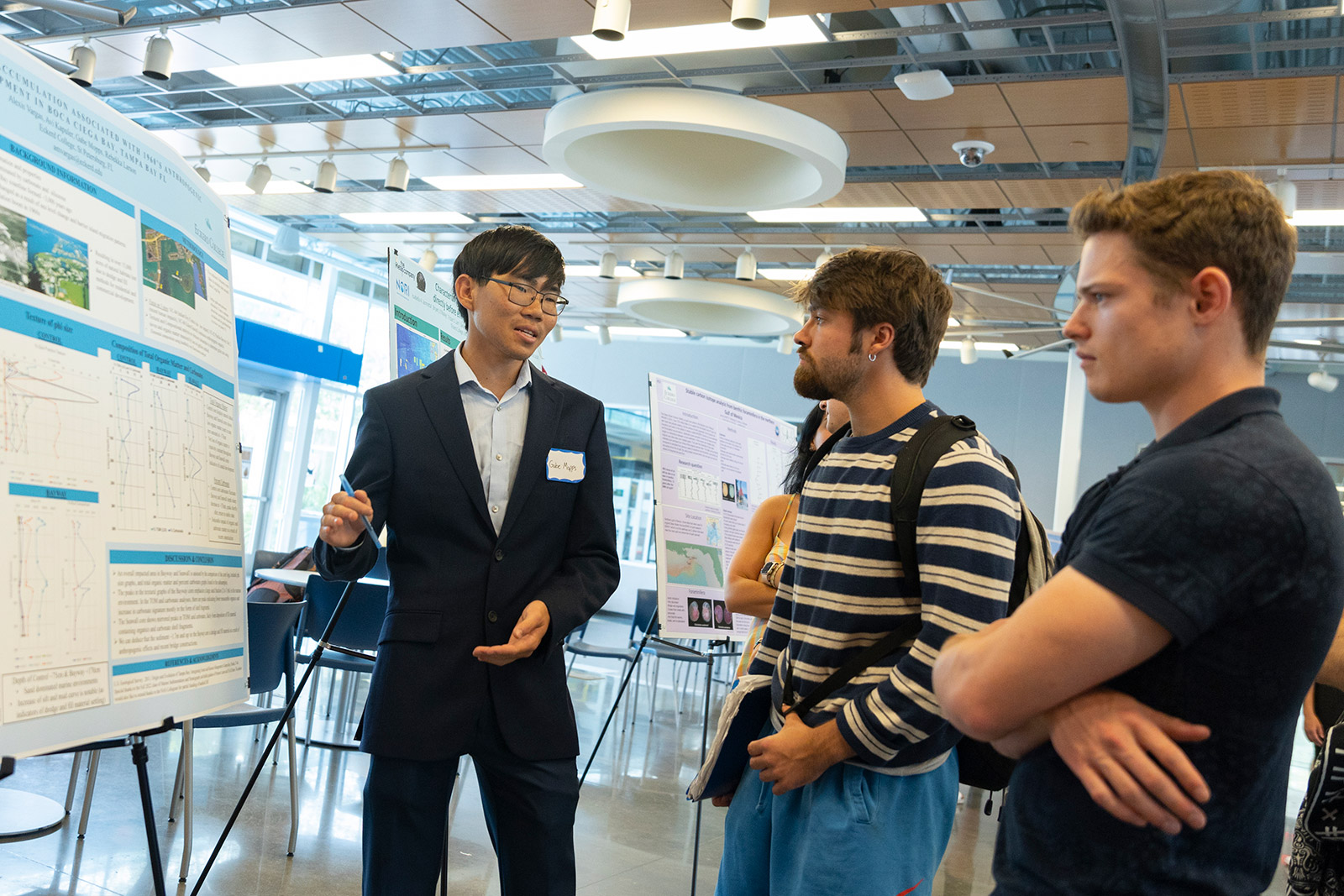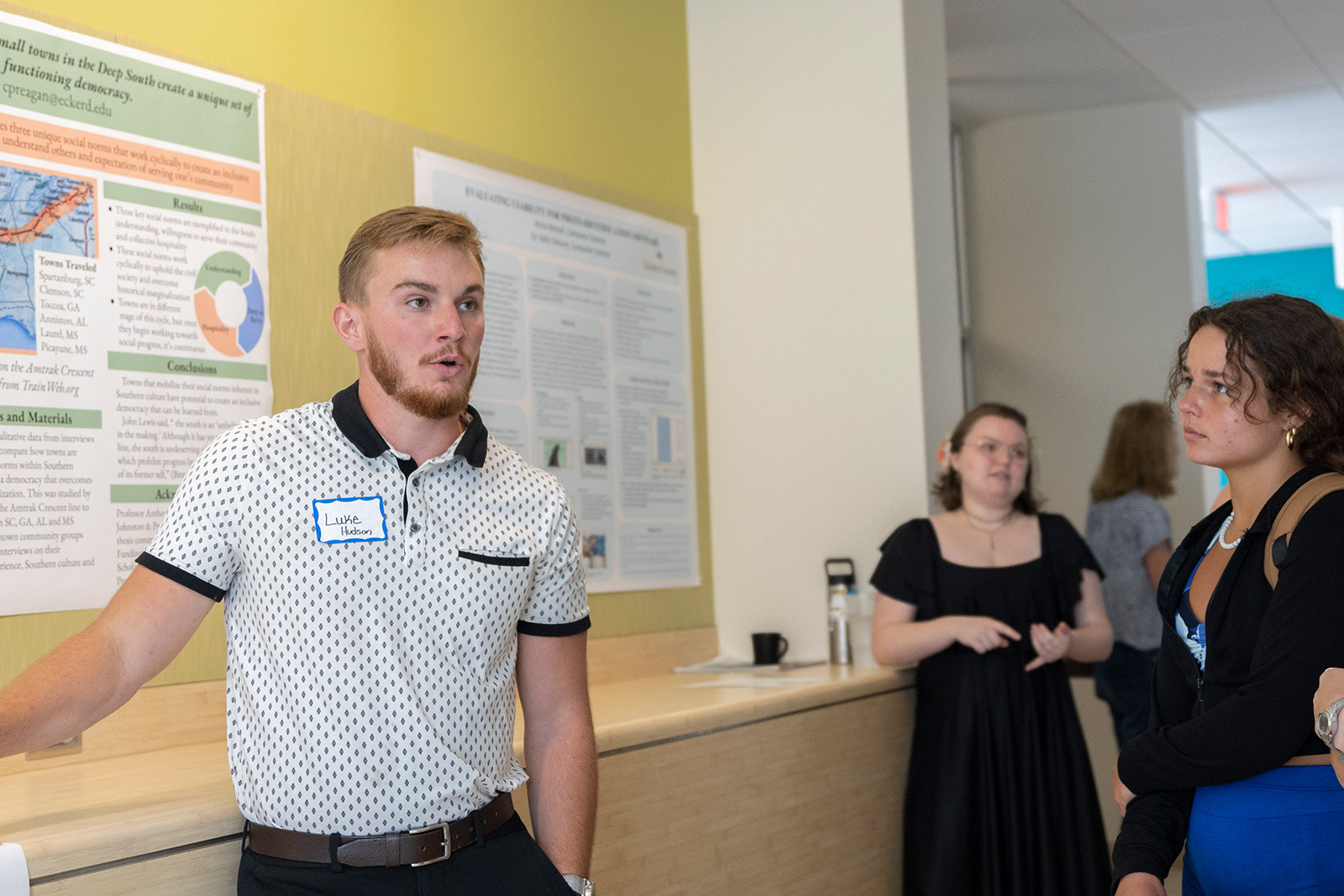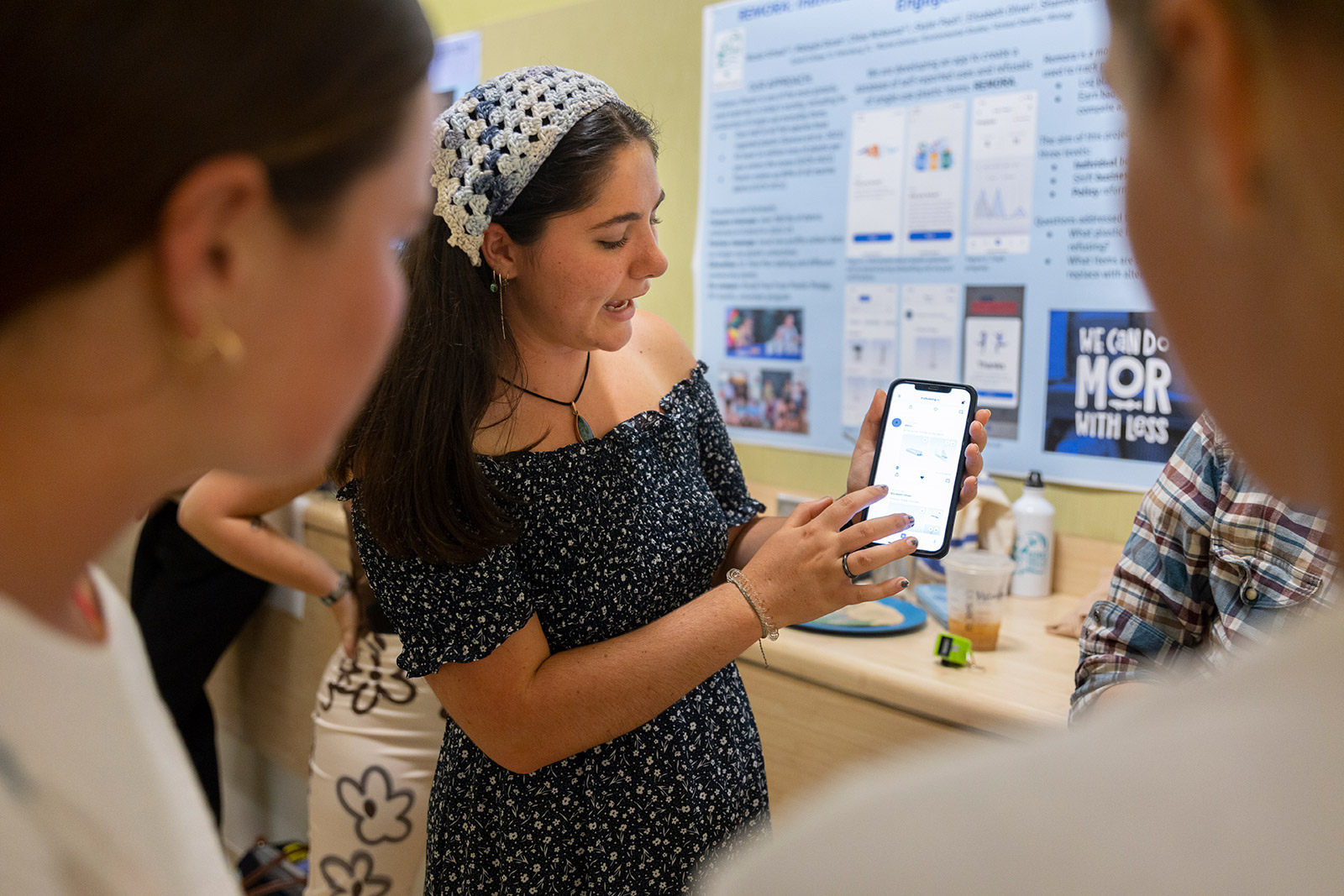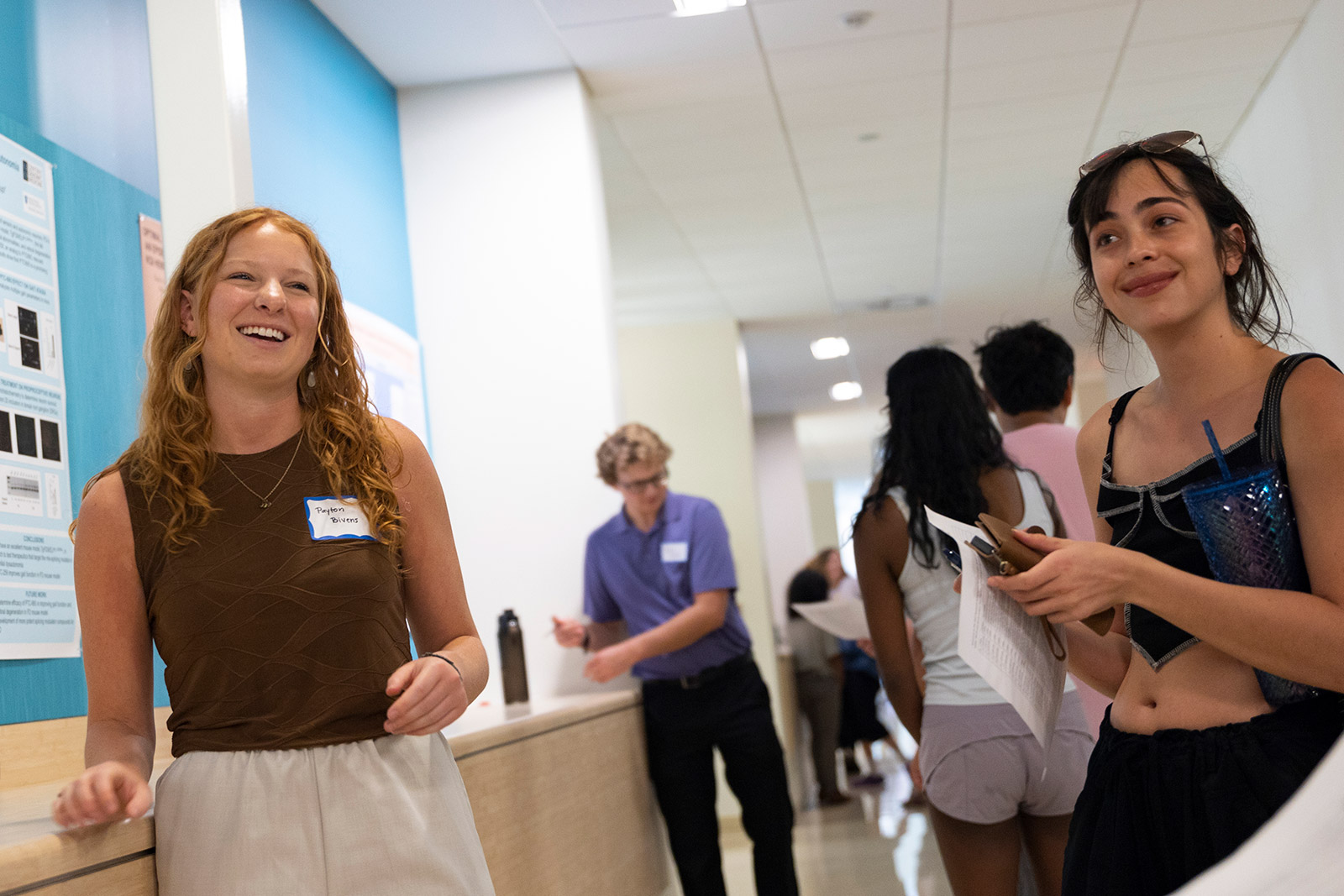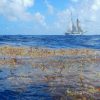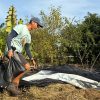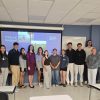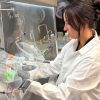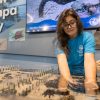Sixty-seven posters lined the hallways and lobby of the James Center for Molecular and Life Sciences on March 29 for the 16th Annual Eckerd College Research Symposium.
The event featured work from 130 students from 37 disciplines sponsored by 40 faculty members from various disciplines—including animal studies, sociology, film studies, political science and marine science.
Judges for this year’s competition were distinguished alumni who were assigned to the categories disease, ecology and basic biology, genetics and molecular biology, humans, marine biology, and marine geology and chemistry. Each category had a first- and second-place winner.
This year’s first-place winner in the humans category was “Declaring Genocide: Framing Human Rights Abuses in the 21st Century,” by senior Macey Woodlock—an international relations and global affairs and environmental studies student from Crystal Lake, Illinois—and Associate Professor of Political Science Michael Burch, Ph.D.
Macey had started her research last January, examining “modern media portrayals of mass atrocities and the use of the term genocide,” she says. She analyzed multiple Western media sources from the start of the ISIS campaign from 2014 to 2020, looking at more than 400 articles over the course of her research. During this time, she also received grant money from the College’s Academic Research Fund to aid in her work. She says her project helped her figure out what she wants to do. “International relations is a broad field,” she explains. “I want to study how conflict impacts people.”
Across the symposium, the undergraduate students worked with not only faculty but also outside organizations like the National Oceanic and Atmospheric Administration, Harvard’s Massachusetts General Hospital, and Michigan State University.
Beth Forys, Ph.D., professor of environmental science and biology and the symposium chair, says events like these are essential for undergraduate students because they allow students to present their research, build relationships with fellow students and learn about collaborators in their field.
“I think [the symposium] shows them what they can do,” Forys says. “Because we don’t have a graduate school, you don’t see graduate students at Eckerd, but here you get to see your peers doing research that often a graduate student would do. I think that’s really, really valuable.”
2023 Eckerd College Research Symposium Winners
Marine Geology and Chemistry
- Judges: Patrick Bryce ’10, Barbara Del Castello ’15, Isabela Rios ’21, Rita Bowker ’00
- First Place: Bailey Inga, Patrick Schwing, Rebekka Larson, Gregg Brooks, Bryan O’Malley, Sophia Chernoch, Tristan Lam
ESTABLISHING BENTHIC RADIOCHEMICAL BASELINES IN THE CLARION CLIPPERTON FRACTURE ZONE (CCZ) - Second Place: Bella Iannotta, Tristan Lam, Rachel Flickinger, Sarah Campbell, Bryan O’Malley, Patrick Schwing
CHARACTERIZING SEDIMENTARY PHYTOPIGMENT VALUES DIRECTLY BEFORE ENVIRONMENTAL IMPACT IN NORI, CLARION CLIPPERTON ZONE
Humans
- Judges: Mary Hilgeman Neal ’06, Will Shedden ’21, Tony Leyh ’13, Alexandra Philippidis ’22, Ken Tremblay ’18
First Place: Macey Woodlock, Dr. Michael Burch
DECLARING GENOCIDE: FRAMING HUMAN RIGHTS ABUSES IN THE 21ST CENTURY - Second Place: Nancy Strever, Lauren Highfill, Sara Hofmann
AN INVESTIGATION OF THE IMPACT OF ANIMAL SHELTER VOLUNTEERING AND DOG TRAINING PROGRAMS ON COLLEGE STUDENTS
Ecology and Basic Biology
- Judges: Alex Barone ’17, Tyler Cribbs ’16, Joy Vincent ’18, Kiana Sladicki ’17
- First Place: Helena Lewis, Maya McElfish, Rita Mehta
ASSESSING BEHAVIORAL RESPONSES TO ECOLOGICALLY RELEVANT PREY CHEMICAL STIMULI - Second Place: Cara Rankin, Peter Simard, Shannon Gowans
IDENTIFYING AND CHARACTERIZING SIGNATURE WHISTLES OF FREE-RANGING BOTTLENOSE DOLPHINS (TURSIOPS TRUNCATUS) IN TAMPA BAY
Disease
- Judges: Tom Battey ’11, Ryan Nazar ’07, Dan Karr ’68
- First Place: Annabelle Elsner, David Degidio, Stephanie Bouley, Francisco Fernandez, James Walker
DEVELOPING A PLATFORM TO STUDY THE PATHOGENIC MECHANISMS OF NF1 MISSENSE MUTATIONS - Second Place: Alyssa Bernstein, Emily Kirchner, Dadi Gao, Ricardo Harripaul, Anila Chekuri, Elisabetta Morini, Susan Slaugenhaupt
TESTING THE IN VIVO EFFICACY OF PTC680, A PROMISING TREATMENT FOR FAMILIAL DYSAUTONOMIA
Genetics and Molecular Biology
- Judges: Jazmine Virzi ’19, Jeffrey Dodge ’84, Rayetta Henderson ’00, Bill Tench ’71
- First Place: Aiden Houck, Alan Jesus Mejia Maza, Vanessa Wheeler
INSTABILITY OF THE X-LINKED DYSTONIA-PARKINSONISM HEXANUCLEOTIDE REPEAT IN MALES AND FEMALES - Second Place: Iris Farnum, Zach McLean, Dadi Gao, James Gusella
THE EFFECT OF GENETIC VARIATION ON BRANAPLAM SPLICE-MODULATION
Marine Biology
- Judges: Emily Freeland ’13, Cat Brown ’88, Skye Dibner ’20
- First Place: Evan Baran, Patrick Schwing, Gregg Brooks, Rebekka Larson
CONTINUING TRENDS OF BENTHIC COMMUNITY CHARACTERIZATION IN THE NORTHERN GULF OF MEXICO - Second Place: Hudson Filas, Kerim Aydin
EXPLAINING SHIFTS IN BODY CONDITIONS IN ALEUTIAN ISLAND FISHES

